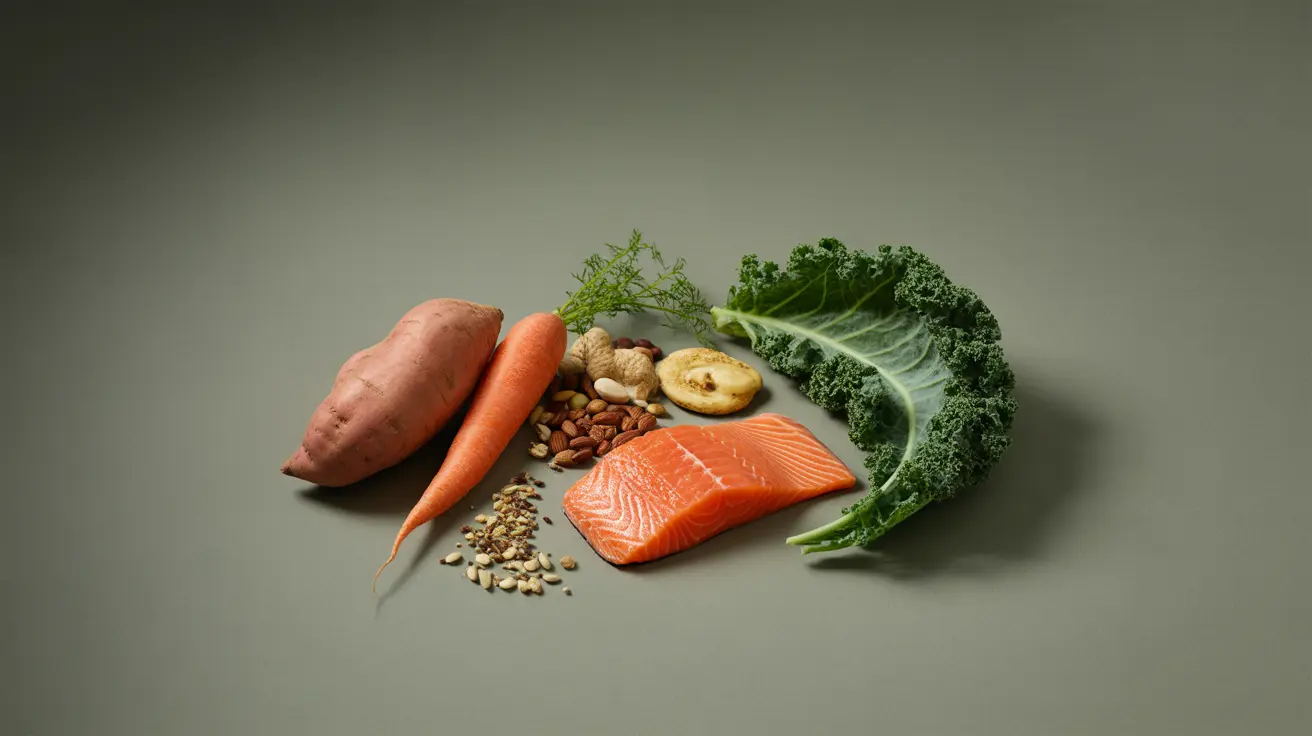Fat-soluble vitamins play a crucial role in maintaining overall health and supporting various bodily functions. Unlike their water-soluble counterparts, these vitamins—A, D, E, and K—are stored in the body's fatty tissues and liver, making them unique in how they're processed and utilized by our system.
Understanding these essential nutrients is key to maintaining optimal health and preventing both deficiency and toxicity. Let's explore their functions, sources, and proper absorption methods to help you make informed decisions about your nutrition.
The Four Essential Fat-Soluble Vitamins
Vitamin A (Retinol)
Vitamin A is fundamental for maintaining healthy vision, immune function, and cell growth. It exists in two forms: preformed vitamin A (retinol) found in animal products, and provitamin A carotenoids found in plant-based foods.
Key functions include:
- Supporting night vision and eye health
- Maintaining healthy skin and mucous membranes
- Promoting proper immune system function
- Supporting reproductive health
- Aiding in proper organ development
Vitamin D (Calciferol)
Often called the "sunshine vitamin," vitamin D is unique because our bodies can produce it when skin is exposed to sunlight. This vital nutrient is essential for:
- Calcium absorption and bone health
- Immune system regulation
- Muscle function
- Mood regulation
- Cell growth and differentiation
Vitamin E (Tocopherol)
Vitamin E acts as a powerful antioxidant in the body, protecting cells from damage caused by free radicals. Its primary benefits include:
- Protection against oxidative stress
- Support for immune function
- Maintenance of healthy skin
- Protection of cell membranes
- Support for proper blood circulation
Vitamin K
Vitamin K exists in two forms: K1 (phylloquinone) and K2 (menaquinone). This vitamin is essential for:
- Blood clotting
- Bone metabolism
- Heart health
- Proper calcium utilization
- Supporting blood vessel health
Absorption and Storage
Fat-soluble vitamins require dietary fat for proper absorption. When you consume these vitamins, they're absorbed along with fats in your diet and stored in your body's fatty tissues and liver. This storage capability means you don't need to consume them every day, but it also increases the importance of proper dosage to avoid accumulation and potential toxicity.
Best Dietary Sources
Natural food sources rich in fat-soluble vitamins include:
- Vitamin A: Sweet potatoes, carrots, spinach, eggs, liver
- Vitamin D: Fatty fish, egg yolks, fortified dairy products
- Vitamin E: Nuts, seeds, vegetable oils, avocados, leafy greens
- Vitamin K: Dark leafy greens, brussels sprouts, broccoli, vegetable oils
Safe Supplementation Guidelines
While obtaining vitamins through diet is ideal, supplements may be necessary for some individuals. However, because fat-soluble vitamins are stored in the body, it's crucial to follow recommended dosages and consult healthcare providers before starting any supplementation regimen.
Frequently Asked Questions
What are the main functions and benefits of fat-soluble vitamins A, D, E, and K in the body?
Fat-soluble vitamins serve essential functions including supporting vision and immune health (Vitamin A), promoting bone health and calcium absorption (Vitamin D), providing antioxidant protection (Vitamin E), and enabling proper blood clotting and bone metabolism (Vitamin K).
How can I ensure proper absorption of fat-soluble vitamins from my diet?
Consume these vitamins with foods containing healthy fats, such as avocados, nuts, or olive oil. This helps your body absorb and utilize these nutrients effectively. Also, maintain a balanced diet with diverse nutrient-rich foods.
What are the signs and symptoms of fat-soluble vitamin deficiencies?
Common signs include night blindness and skin problems (Vitamin A deficiency), bone pain and weakness (Vitamin D deficiency), muscle weakness and vision problems (Vitamin E deficiency), and easy bruising or bleeding (Vitamin K deficiency).
Can taking too many fat-soluble vitamin supplements be harmful, and what are the risks of toxicity?
Yes, excessive intake can be harmful because these vitamins are stored in body tissues. Toxicity can lead to various symptoms including nausea, blurred vision, bone pain, and in severe cases, organ damage. Always follow recommended dosages and consult healthcare providers.
Which foods are the best natural sources of fat-soluble vitamins?
The best sources include colorful vegetables, fatty fish, eggs, nuts, seeds, and leafy greens. Specific examples are sweet potatoes and carrots for Vitamin A, salmon for Vitamin D, almonds and sunflower seeds for Vitamin E, and kale and spinach for Vitamin K.




